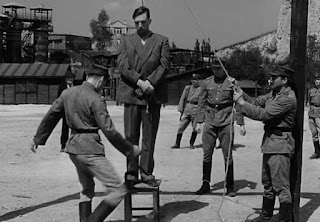Albert Pierrepoint.
Period on Home Office List 1932-1956.
Albert Pierrepoint was born at Clayton in Yorkshire on the 30th of March 1905, the son of Henry Pierrepoint and nephew of Thomas.
He would go on to be by far the most prolific hangman of the 20th century having been assistant or principal at the hangings of 433 people including 16 women in his 24 years of service in this country and abroad.
His tally of executions was greatly increased as a result of World War II, working at Hameln (Hamelin) prison in the British controlled sector of Germany between 1945 and 1949 where he carried out 201 executions, including 149 men and ten women who were convicted of war crimes, 40 for civilian crimes plus two British soldiers convicted of murder.
The most notable of this series of executions was the first batch which took place on the 13th of December 1945, when he hanged 13 prisoners at Hameln. They were 11 members of staff from the Belsen Concentration Camp, including Irma Grese, Elizabeth Volkenrath and Johanna Bormann, Josef Kramer, the "Beast of Belsen" (the Commandant of the Bergen-Belsen concentration camp) and 7 other male staff.
A further two men convicted of the Almelo murders of a British soldier and a Dutch civilian were the last pair to hang on this day.
He also carried out 14 hangings in other countries, including Austria (eight male hangings in Graz-Karlau prison), where he trained Austrian hangmen to carry out other death sentences passed by British Military Courts there. There were four executions in Egypt of British servicemen, three in 1950 and the fourth in 1952, plus two hangings in Gibraltar of war criminals in 1944.
In England and Wales Albert assisted at 29 hangings and carried out 138 civilian executions for murder as principal, including those of the last four women to hang. He carried out nine hangings in Scotland between 1948 and 1954. As assistant or principal Albert was to execute 14 men convicted of espionage, treachery and treason during and immediately after World War II.
These included John Amery, who told Albert that he had always wanted to meet him, as he was about to be led to the gallows at Wandsworth on the 19th December 1945 and Nazi propagandist "Lord Haw-Haw", real name William Joyce, at Wandsworth for treason on the 3rd of January 1946. Theodore Schurch was the last person to be executed for treachery in Britain when Albert hanged him at Pentonville on the 4th of January, 1946.
His first experience of the family “trade” was assisting his uncle Tom in the hanging of Patrick McDermott at Mountjoy Prison in Dublin on the 29th of December 1932. His first job as an assistant in England was again with his uncle, at the execution of Richard Hetherington at Liverpool’s Walton prison on the 20th of June 1933. His first execution as "Number 1" was that of gangster, Antonio "Babe" Mancini, at Pentonville Prison on the 17th of October 1941.
Albert is credited with the quickest hanging on record when he, assisted by Sid Dernley, executed James Inglis in only 7 seconds on the 8th of May 1951 at Strangeways in Manchester. Albert took over from his uncle as the hangman for the Irish Republic and carried out the last four executions there, up to 1954, when Michael Manning became the last person to be executed in Eire.
Some of his notable executions were :
Neville George Clevelly Heath who was hanged on the 16th of October 1946 at Pentonville Prison for the sexual/sadistic murder of Margery Gardner who was found dead in a hotel bedroom. When discovered, she was lying on her back in one of the single beds nearest to the door. She was naked and had her ankles bound with a handkerchief.
She had a lot of bruising to her face and her nipples had been almost bitten off. Something had been inserted into her vagina and sharply rotated. On her back were 17 criss-cross lash marks. The cause of death had been suffocation, but only after the horrific injuries had been inflicted.
During World War II, Albert assisted his uncle Tom in the hanging at least six of the 16 American soldiers at Shepton Mallet military prison in Somerset. They had been condemned by Courts Martial for murder and/or rape.
John George Haigh, the famous "Acid bath murderer," came his way on the 10th of August 1949 at Wandsworth prison for the murder of Mrs. Olive Durand-Deacon. Her gallstone and dentures were not dissolved by the acid in which he had dissolved the rest of her body and remained to convict Haigh. She was one of Haigh’s six victims.
Albert gave evidence to the 1949 Royal Commission on Capital Punishment, chaired by Sir Ernest Gowers and also a demonstration of the technique of hanging.
Derek Bentley was hanged on the 28th of January 1953, at Wandsworth, for his part in the murder of PC Miles. The case has been the subject of books and the film "Let him have it".
Another controversial case was that of Timothy John Evans whom Albert hanged on the 9th of March 1950 at Pentonville for the murder of his wife at 10 Rillington Place, the home of John Reginald Christie. Christie admitted killing seven women in total. He was hanged on the 15th of July 1953 at Pentonville Prison. In 1966, Evans was granted a posthumous pardon.
On Tuesday the 28th of November 1950 Albert hanged James Corbitt at Strangeways in Manchester for the murder of his girlfriend. Corbitt had been a regular at Albert’s pub and they had sang together on a Saturday night.
The had nicknamed each other “Tish” and “Tosh”. Allegedly it was only when Albert went to look at the prisoner on the Monday night he realised who he was about to hang. They greeted each other with their nicknames the following morning.
On the 13th of July 1955 at Holloway Prison, Ruth Ellis became the last woman to be hanged in Britain.
Albert’s last execution was that of 25 year old Norman Green at Liverpool’s Walton prison on Wednesday the 27th of July 1955. Green had stabbed two children to death in separate murders in 1954 and 1955. There were only three more executions in 1955 and none in 1956. All other condemned prisoners were reprieved during this period whilst Parliament debated the subject and came up with the Homicide Act of 1957.
Albert Pierrepoint resigned over a disagreement about fees in 1956. He had driven to Strangeways on a bitterly cold day in January 1956 to hang Thomas Bancroft. He arrived at the prison only for Bancroft to be reprieved later in the afternoon. He claimed the full fee of £15, (more than £200 at today's prices), but was offered just £1 in out of pocket expenses by the Under sheriff of Lancashire.
Pierrepoint appealed to his employers, the Prison Commission, who refused to get involved. The Under sheriff sent him a cheque for £4 in final settlement. But to Albert this was a huge insult to his pride in his position as Britain's Chief Executioner so he tendered his resignation.
In his autobiography he also revealed that there was a feeling of duty in what he did as well.
"That sanctity must be most apparent at the hour of death," he wrote. "A condemned prisoner is entrusted to me, after decisions have been made which I cannot alter. He is a man, she is a woman, who, the church says, still merits some mercy. "The supreme mercy I can extend to them is to give them and sustain in them their dignity in dying and death. The gentleness must remain."
Albert died in a nursing home in Southport, Lancashire, on the 10th of July 1992 at the age of 87.












Comments
Post a Comment